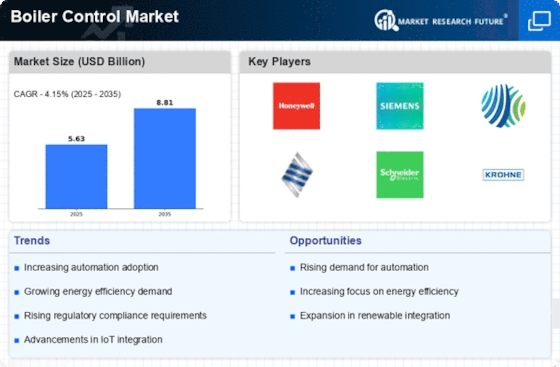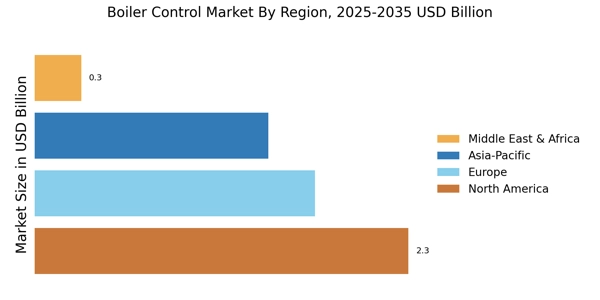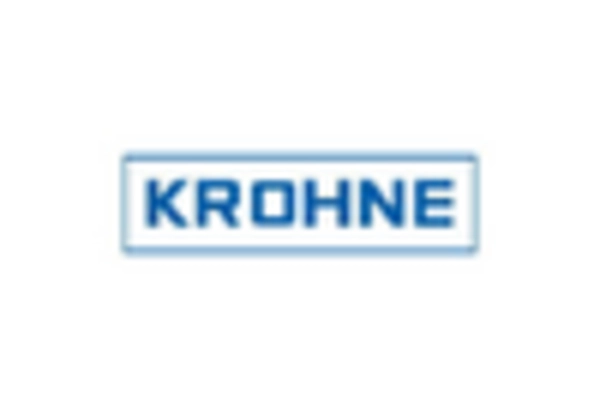Rising Energy Efficiency Standards
The Boiler Control Market is experiencing a notable shift towards enhanced energy efficiency standards. Governments and regulatory bodies are increasingly mandating stricter energy efficiency regulations for industrial and commercial boilers. This trend is driven by the need to reduce greenhouse gas emissions and lower energy consumption. As a result, manufacturers are compelled to innovate and develop advanced boiler control systems that optimize fuel usage and minimize waste. The market for energy-efficient boiler controls is projected to grow significantly, with estimates suggesting a compound annual growth rate of over 5% in the coming years. This focus on energy efficiency not only aligns with environmental goals but also offers cost savings for end-users, thereby driving demand in the Boiler Control Market.
Expansion of the Renewable Energy Sector
The expansion of the renewable energy sector is significantly impacting the Boiler Control Market. As the world transitions towards cleaner energy sources, there is an increasing need for boiler systems that can efficiently integrate with renewable energy technologies. This includes the use of biomass, solar thermal, and other renewable sources in boiler operations. The market is adapting to these changes by developing control systems that optimize the use of renewable energy, thereby enhancing overall system efficiency. Projections indicate that the integration of renewable energy in boiler systems could lead to a market growth rate of around 5% in the coming years. This trend not only supports the shift towards sustainable energy but also presents new opportunities for innovation within the Boiler Control Market.
Growing Demand for Industrial Automation
The growing demand for industrial automation is significantly influencing the Boiler Control Market. As industries strive for increased productivity and reduced operational costs, the automation of boiler systems has become a priority. Automated boiler controls facilitate seamless integration with other industrial processes, enhancing overall efficiency. This trend is particularly evident in sectors such as manufacturing and energy, where automated systems are essential for maintaining optimal performance. Market data suggests that the automation segment within the Boiler Control Market is expected to expand at a rate of 6% per year, driven by the need for reliable and efficient operations. Consequently, manufacturers are focusing on developing advanced boiler control solutions that cater to the automation needs of various industries.
Technological Advancements in Control Systems
Technological advancements are playing a pivotal role in shaping the Boiler Control Market. The integration of sophisticated control systems, such as programmable logic controllers (PLCs) and distributed control systems (DCS), enhances the operational efficiency of boilers. These technologies enable real-time monitoring and control, allowing for precise adjustments to boiler operations. Furthermore, the adoption of artificial intelligence and machine learning algorithms is expected to revolutionize boiler control by predicting maintenance needs and optimizing performance. The market is witnessing a surge in demand for these advanced control systems, with projections indicating a potential increase in market size by approximately 7% annually. This trend underscores the importance of innovation in maintaining competitiveness within the Boiler Control Market.
Increased Focus on Environmental Sustainability
The Boiler Control Market is witnessing an increased focus on environmental sustainability, which is reshaping market dynamics. As organizations prioritize sustainable practices, there is a growing demand for boiler control systems that minimize emissions and enhance energy efficiency. This shift is largely influenced by consumer preferences and regulatory pressures aimed at reducing carbon footprints. Manufacturers are responding by developing eco-friendly boiler control solutions that comply with stringent environmental regulations. Market analysis indicates that the demand for sustainable boiler control technologies is likely to grow by approximately 8% annually, reflecting a broader trend towards sustainability in industrial operations. This emphasis on environmental responsibility is expected to drive innovation and investment within the Boiler Control Market.

















